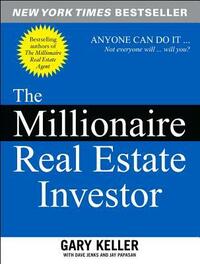You need to sign in or sign up before continuing.
Take a photo of a barcode or cover
In a bull market, everyone seems like a genius.
Though the advice contained in this book is, in general, sound, following it will lead the average American on a sure path to misery. That is probably why the first section—almost 100 pages—is a rambling pep talk with about as much relevance to real estate as real analysis. The book fails because it does not do enough to explain the harsh realities of real estate investing.
The market might trend upward, but a "buy and hold" investment made at the wrong time will cripple an investor just getting his start. The "buy and rent" segment sounds like a great idea, too, right until you find out how easy it is for tenants to abuse the laws designed to protect them. The effects of a bad first investment or a bad tenant might not just slow you down, they can present a financial setback on the order of several years. For every highly-visible real estate superstar out there, there are dozens who have failed, and it's not because they're particularly stupid, lack connections, or didn't meticulously journal their finances.
Another issue I take with this book is how it doesn't discuss the difficulty of finding dependable property managers. Think of it this way- why would anyone want to be a property manager? It seems intuitive that property management is a profession in which the managers enrich themselves by having unlimited capacity to screw over landlords. When we start talking about "hiring a CEO" to take over your growing empire, we need to also think critically about who would possibly fill that position. If you're dealing with an eight figure portfolio, you can probably attract talent, but anything less than that and you run the risk of the "CEO" milking you for your connections and knowledge before starting a rival company in the same town. This is a problem that plagues many profitable small businesses that have potential to become more-passive medium-sized businesses.
At no point in The Millionaire Real Estate Investor is it clear whether real estate investing is supposed to be a hobby or a full-time occupation. The step between "hey, walk around a neighborhood, check out local listings and make a few calls in your spare time" to "here is how much time you have to spend per day growing your network and performing other tasks" is a large one and seems to purposefully be left ambiguous.
After wading through all the fluff and motivational quotes, I strongly believe that the core advice here is helpful and worth referencing. It covered nearly all the bases aside from the glaring omissions that make real estate much less sexy than it seems on House Hunters. I feel no motivation to read other books on the topic after having read this one.
View this review and others on my blog
Though the advice contained in this book is, in general, sound, following it will lead the average American on a sure path to misery. That is probably why the first section—almost 100 pages—is a rambling pep talk with about as much relevance to real estate as real analysis. The book fails because it does not do enough to explain the harsh realities of real estate investing.
The market might trend upward, but a "buy and hold" investment made at the wrong time will cripple an investor just getting his start. The "buy and rent" segment sounds like a great idea, too, right until you find out how easy it is for tenants to abuse the laws designed to protect them. The effects of a bad first investment or a bad tenant might not just slow you down, they can present a financial setback on the order of several years. For every highly-visible real estate superstar out there, there are dozens who have failed, and it's not because they're particularly stupid, lack connections, or didn't meticulously journal their finances.
Another issue I take with this book is how it doesn't discuss the difficulty of finding dependable property managers. Think of it this way- why would anyone want to be a property manager? It seems intuitive that property management is a profession in which the managers enrich themselves by having unlimited capacity to screw over landlords. When we start talking about "hiring a CEO" to take over your growing empire, we need to also think critically about who would possibly fill that position. If you're dealing with an eight figure portfolio, you can probably attract talent, but anything less than that and you run the risk of the "CEO" milking you for your connections and knowledge before starting a rival company in the same town. This is a problem that plagues many profitable small businesses that have potential to become more-passive medium-sized businesses.
At no point in The Millionaire Real Estate Investor is it clear whether real estate investing is supposed to be a hobby or a full-time occupation. The step between "hey, walk around a neighborhood, check out local listings and make a few calls in your spare time" to "here is how much time you have to spend per day growing your network and performing other tasks" is a large one and seems to purposefully be left ambiguous.
After wading through all the fluff and motivational quotes, I strongly believe that the core advice here is helpful and worth referencing. It covered nearly all the bases aside from the glaring omissions that make real estate much less sexy than it seems on House Hunters. I feel no motivation to read other books on the topic after having read this one.
View this review and others on my blog
informative
medium-paced
informative
reflective
medium-paced
informative
inspiring
medium-paced
A great read! The author did a great job in describing real estate investment. The book is very thorough and very motivational and inspiring. I would definitely recommend this book to those who are interested in real estate investment.
I thoroughly enjoyed this book. I think the author did a very good job of succinctly explaining real estate investing in as simple terms as possible. He stressed that hard work was required but that real estate investing is very possible. I would definitely recommend to those interested in real estate investing.
A great read and simplistic in its details for any new real estate investor. I definitely recommend it to anyone interested in real estate investing.
The other real estate books I read gave a more beginner approach to buying and holding houses, but this one used that as a starting point to theorize on how far you could go if you kept it up. Now, I don't think that's for me, but it's interesting to hear about what kind of commitment you would need to buy that many houses, or manage that many.



